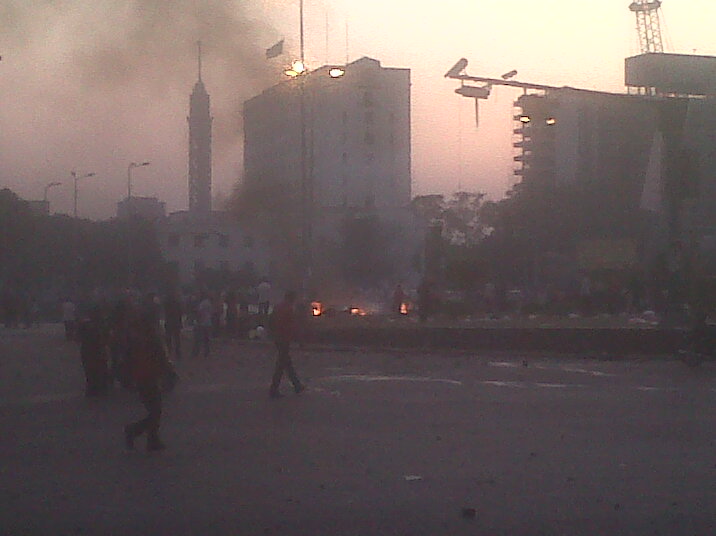Story
 July 4, 2011
July 4, 2011
Youth Protesters and Street Gangs Clash in Tahrir Square's Tent City
Country:

With one set of strong arms gripping his neck and shoulders, the young man was forcibly dragged from the square, kicking and screaming. As the crowd massed around him, he was first punched in the head, and then kicked, before he was set on with wooden staves fashioned from nearby fence posts. Eventually, he was carried away in the direction of Mohamed Mahmoud Street, while one woman—perhaps a sister or his mother—trailed in the wake of the baying crowd, shrieking uncontrollably.
On Sunday evening, July 3, 2011, in the immediate aftermath of stone-throwing battles between groups of rival youths in downtown Cairo, some in Tahrir Square handed out a kind of summary justice to those they accused of acting as provocateurs to foment chaos and infighting among protesters camped out in the square since last Friday.
Starting at approximately 6 p.m., volleys of stones flew back and forth between youthful protesters and so-called baltagiya, or street gangs, who some claimed had tried to clear the square of its 'tent city'. (Civilian protesters had erected makeshift shelters after fighting with central security services on June 28, 2011, the first significant clashes since the high ebb of the popular revolt that succeeded in bringing down the former regime earlier this year.)
A crowd in the hundreds gathered on the surrounding pavement to watch the stone-throwing. Eventually the protesters from the tent city—though it was difficult to make out one side from the other—succeeded in overrunning the baltagiya. The victors promptly set to burning much of the refuse and debris that had accumulated on the central reservoir of Tahrir Square, a grassy knoll where fourteen tents had been standing. Shortly thereafter, an oil drum rolled into one of the fires, causing many in the vicinity to scatter for fear of an explosion. The fires prevented any traffic, ambulances included, from passing through the square until they were eventually doused out.
Protests in the square have continued due to the lack—to date—of any resolutions to the most pressing popular demands: an end to the long-running Emergency Law that mandates the use of special military tribunals by the interim government; convictions for members of the security forces, including high-ranking officials, on trial for the deaths of protesters during the revolution; and an end to police brutality and unaccountability. As many as 10,000 protesters are thought to have been referred to military courts since late January.
In what is quickly becoming a running theme, it was announced earlier in the day that convictions in the cases of 48 defendants charged with inciting sectarian clashes at the St. Mina and Virgin Mary Coptic Churches in the Imbaba district of Cairo on May 7 and 8, which resulted in 15 deaths and almost 200 injuries, had been postponed until September. Resumption of the trials is pending the construction of a new dock in the military court, which will separate the Muslim and Coptic Christian defendants, as well as new witness testimony presented by the prosecution. Clashes broke out in May between Christians and ultraconservative Salafi Muslims over the case of Abeer Fakhri, an alleged convert to Islam who Salafis claimed was being held against her will in a Coptic church.
The announcement in the Imbaba cases follows on the back of the news late last week that sentencing in the trial of the former Interior Minister, Habib el-Adly, who stands accused of ordering the killing of civilian protesters during the clashes earlier in the year, will be postponed until August and may yet require the appointment of a new sitting judge. El-Adly was convicted in May on money laundering and profiteering charges, but has yet to face sentencing on charges of ordering the killing of protesters.
Meanwhile, attorneys for the family of Khaled Said, the twenty-six year old allegedly killed by state security officers in Alexandria six months ago, whose death galvanized many to take part in the protests against the government, also requested a postponement of sentencing in order to seek harsher charges against the two officers accused of his murder. The announcement came as a mixed disappointment to many from Alexandria and Cairo who had traveled to the courthouse expecting to hear the first major convictions of the transitional era.
When asked the reasons for the clashes or for the presence of baltagiya among the crowds in Tahrir, answers from the surrounding bystanders ranged wildly. Some youths who had taken part in pelting their opponents with stones alleged that the police had paid off the baltagiya to help clear the square, and thereby return life downtown to normal. Other eyewitnesses remarked that the fighting might have resulted from a dispute between rival tea or juice sellers, many of whom have populated the square since thousands turned out in Tahrir last Friday. Still others alleged that the youth protesters and the baltagiya had nothing better to do but fight for lack of work. "This is all theater," remarked the man perched next to me on the railings that ring in the square. "The reasons for this are not clear, but in any event they should stop protesting and get back to work."
Support our work
Your support ensures great journalism and education on underreported and systemic global issues